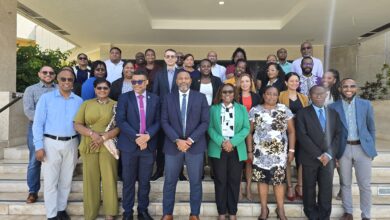Twenty-seven young persons representing thirteen Member States and three Associate States of the Caribbean Community (CARICOM) as Youth Ambassadors have been encouraged to develop and articulate a shared vision for the Caribbean that focuses on improving the quality of life for all in the Community. The charge was given by Deputy Secretary-General of CARICOM, Ambassador Lolita Applewhaite during an address at an induction ceremony for the CARICOM youth representatives held at the Eastern Caribbean Central Bank (ECCB) Headquarters St Kitts and Nevis on Tuesday (August 3).
In her presentation, Ambassador Applewhaite noted that the pace of social and economic change in the Community in recent years has been constant and dynamic, influenced greatly by the impact of globalization, trade liberalization and new technologies. Highlighting that young people account for approximately 50% of the population of the Community, she pointed to the sad fact that, at the same time, this age group is the one most affected by the HIV/AIDS pandemic.
The CARICOM Deputy Secretary-General told the gathering that this problem threatened the Community's social and economic systems, and in the process has adversely changed the structure of families and the quality of life. Against this background, she said, the sustainability of the Caribbean Community will require a shared vision for a better life for all Caribbean peoples, and one that connects youth empowerment to the goals of regional integration and the development process.
During the induction ceremony for the third batch of CARICOM Youth Ambassadors since 1994, the youth leaders were challenged by the Governor of the ECCB, Sir Dwight Venner, “to look to the future with hope and optimism.” He noted that although today's challenges are more complex in character, the availability of information and advanced technology provide the means by which young persons can cope with such challenges. Using data released by the World Bank, Sir Dwight listed the high-risk areas for youth in the Region as being sexual and physical abuse, early initiation into sexual activity, HIV/AIDS, the incidence of rape, unemployment, youth and gang violence, alcohol and drug abuse.
He emphasized the need for all social institutions to invest time and resources to address the needs and issues of the youth in order to secure a “bright future” for the Region, adding that the youth themselves need to participate fully in their own development. “We all must make choices in our lives, and while the community, the society and the government must create the environment to assist with the progress of the youth, the youth themselves must acquire the mental, physical, and spiritual discipline to become high achievers and overcome the obstacles in their way,” he stressed.
Meanwhile, speaking at the function, the Deputy Prime Minister and Minister of International Trade, Labour, Social Security, CARICOM Affairs, Telecommunications and Technology for St Kitts and Nevis, Hon. Sam Condor expressed the view that a nation's future and survival are dependent on the character and capabilities of its young people. The Minister told the participants: “It is my hope that our youth leaders and all those involved in the grooming of our young people would go beyond the generalities of building self-esteem and promoting leadership, and advance practical solutions to the urgent and complex pressures of our rapidly developing societies which seem to be overwhelming our youths.”
Citing the call by the youth themselves for better networking and co-ordination of youth programmes and services in the Region, the Minister said now is the right time for partnerships within communities especially those that strengthen the relationships between the different generations, combining experience with energy to create more peaceful and prosperous societies.
The induction of the youth ambassadors coincided with the official opening of the Third Meeting of CARICOM Directors of Youth in St. Kitts and Nevis. In declaring the Meeting open, the country's Minister of Information, Culture, Youth and Sports, Hon. Jacinth Henry-Martin advised the youth to position themselves to not only benefit from changes around them, but to be instruments of change, and to be catalyst for life-changing innovations. She exhorted them to see themselves not as employees, but as employers, urging that they become “an effective, proactive, audible and visible sector.”
She told the Youth Ambassadors that all eyes would be on them as youth leaders and that there would be high expectations for them to succeed in diverse fields and in their duties as advocates of the regional integration movement. “To whom much has been given, much is expected,” she concluded.
Contact:
The Communication Unit
Tel : 592-2269281-9 or 225-7758/227/4720
Email : carisec3@caricom.org or carisec4@caricom.org





